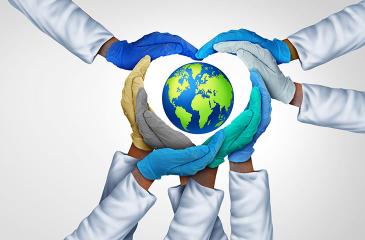Each year on April 7, those involved in health care around the globe celebrate World Health Day.
Shailey Prasad, executive director of the Center for Global Health and Social Responsibility and professor in the Department of Family Medicine and Community Health in the Medical School, has dedicated his career to furthering equity in health care systems across the world. He shares his insight on dealing with the current crises in global health and how we can prepare for a better future.
Q: What do you see as the biggest issues facing global health today?
Dr. Prasad: Global health is primarily about equity. There is a strong recognition that the challenges facing humankind need to be addressed in all parts of the world, and that if we do not do this, we end up with an increased burden of diseases. The biggest challenge is achieving health equity amongst all people around the world.
Climate change and its attendant consequences are also major threats in global health and will possibly overwhelm us in the years to come. Current global health systems are not equipped to deal with these challenges in a coherent way. We need robust public health and primary care in all places around the world.
Q: What type of work are you doing to advance the future of global health?
Dr. Prasad: We take the premise of “social responsibility” very seriously. To achieve this, our Center for Global Health and Social Responsibility is involved in conversations about ethical engagements in global health. We have been one of the primary drivers of the Brocher Declaration, which is a policy guide for short-term global health engagements designed to reduce harm, protect patients, prioritize host communities and address power imbalances. Our center also leads the Democratizing and Decolonizing Global Health workgroup of the NIH/Fogarty sponsored global health training consortia.
We are also involved in forming meaningful partnerships with universities around the world to advance research and education in health. This connects to our work in capacity building as well, particularly for increased global health care workforce development.
Q: Why is environmental health so closely linked to human health?
Dr. Prasad: I like to look at the entire world as an organism. Within this framework the various entities are interconnected. This is particularly so with the environment in which we live. We know that changes and damages to the environment can significantly affect the health of people living in the environment. For example, let us consider New Delhi, India—it is unfortunately one of the most polluted cities in the world. The air pollution there is so concerning that breathing the air there for a year is like smoking a pack of cigarettes a day for a year. This causes significant damage to the lungs and the rest of the body. These changes can also get encoded in our genes (what is called epigenetic changes) that can then last for generations.
Q: How do you meaningfully engage with other countries in health efforts?
Dr. Prasad: The key is to make sure that the agenda is that of the country and community—not ours. Many global health practitioners have had a history of imposing our will in global health activities. This becomes an “I have a hammer, where is the nail” approach. For global health efforts to be meaningful, they have to be driven by the local communities. They have to be sustainable and mutually beneficial.
Q: How is the University training the next generation of health practitioners to better prepare for global health crises?
Dr. Prasad: We emphasize the importance of strong ethical frameworks in health practitioners. Our byline should be “learning from and with each other.” Inherent in this statement is a humility and intellectual curiosity that is critical for meaningful global health engagement
We also emphasize the need for an interdisciplinary approach to global health. Quite often people mistake global health to be a clinical need. But global health has to be more comprehensive. The University of Minnesota has a variety of critical disciplines for effective global health. The challenges in global health require engagements with the social and political determinants of health—solutions beyond the prescription pad or scalpel.



